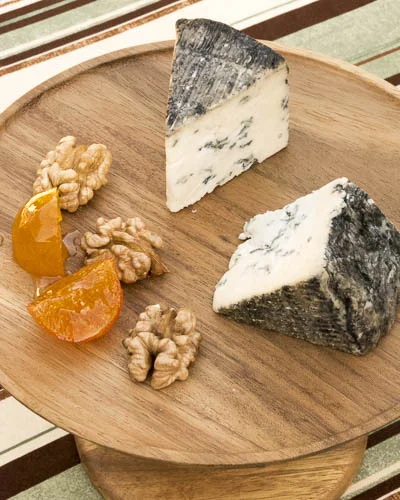Persillé de Rambouillet
Remember the missing Morbier? Over the past two years, the FDA detained several imported cheeses because they contained vegetable ash, an ingredient the agency considered a non-permitted colorant. Never mind that European cheesemakers have been using ash for centuries—largely to make the surface of acidic cheeses more hospitable to good molds. Numerous scientific reviews have found nothing scary about ash.
After causing a great deal of anguish and financial loss for producers and importers, the FDA has now granted GRAS (generally recognized as safe) status to a vegetable ash from Chr. Hansen, a supplier of cultures and other products to cheese makers. In fact, this is the same ash paste that the company was selling before, but by reclassifying it as a product used for cheese making, it’s now okay. (The paste is still available as a colorant but, cheesemakers, you don’t want that one.)
Presumably, creameries that had halted exports to the U.S. will resume as soon as they transition to the approved product. Which is the same product, but never mind. American producers of ashed cheeses seemed to have escaped FDA scrutiny, but they’re likely relieved to have a compliant alternative. Nobody should have to reformulate recipes unless they’re moving from powdered ash to paste.
Robert Aguilar, an account manager for Fromagex, which represents Chr. Hansen in the U.S., says his company worked on this issue (non-issue?) for a long time. “Even if it’s an exercise that didn’t need to happen,” says Aguilar, “it’s bringing more clarity, which is a good thing.”
Wine Country Wow
James Ayers
Napa Valley’s newest cheese counter debuted last weekend in Atelier JCB, a glitzy new fine-food shop from vintner Jean-Charles Boisset. Working under a massive Baccarat chandelier, cheesemonger James Ayers has room for about 120 selections—far fewer than in his former post at Sunshine Foods in St. Helena, but the focus here is quality, not quantity. The opening-day inventory included small-production gems like Sarró de Cabra, a Spanish goat cheese; Surfin’ Blu, a beer-washed buffalo-milk cheese from Italy; and Rosie’s Robiola from Boxcarr, a new North Carolina creamery. Locals receive a 10 percent discount.
Atelier JCB
6505 Washington Street
Yountville
Open daily from 11 a.m. to 7 p.m.
A Small Victory
Or maybe it’s a large one. Time will tell, but for now the FDA has paused its aggressive testing of raw-milk cheeses. This welcome news, which the FDA announced last week in a public statement, follows a big outcry from cheese-industry leaders and consumers. Kudos to the American Cheese Society for engaging FDA in a calm, respectful dialogue rooted in science. And a shoutout to Oldways Cheese Coalition for rallying the public.
As I reported previously, FDA had dramatically lowered the permissible level of nontoxigenic E.coli in cheese. These bacteria sound alarming, but they’re the same E.coli that populate our gut. We coexist happily, with no ill effects. FDA was using these bacteria in cheese as a marker for creamery cleanliness—a misguided notion, cheesemakers and dairy scientists said. The tightened standards were virtually impossible for raw-milk cheesemakers to meet and did nothing to enhance public health.
FDA is “pausing” its testing program, not discontinuing it, so the battle isn’t won. But the agency has pledged to “re-evaluate its criteria,” which sounds like progress. And in language that strikes me as remarkably warm and fuzzy for the FDA, the agency said it wanted “to acknowledge our respect for the work of the artisan cheesemakers who produce a wide variety of flavorful, high-quality cheeses using raw milk and our appreciation for the great care that many take to produce raw milk cheeses safely.” They got that right.


